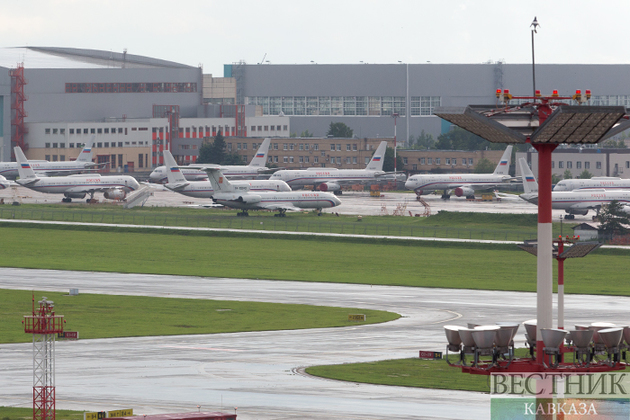Asia-based aircraft leasing companies are scrambling to cut ties with Russian airlines under new sanctions triggered by the invasion of Ukraine, in another blow for a sector reeling from the COVID-19 pandemic.
Nikkei Asia reports that the European Union announced new regulations on the weekend that require plane lessors to terminate their rental contracts in Russia by March 28, a move that reportedly could affect more than 500 jets leased to Russian carriers by foreign companies, including dozens of rented planes from companies backed by Asian investors.
Japan's SMBC Aviation Capital has the biggest exposure among Asia-based operators with 36 aircraft rented to Russian carriers, or about 11% of its global fleet, according to calculations by research company CreditSights. Most recently, SMBC delivered four new Airbus A321neo jets to Ural Airlines.
Parent company Sumitomo Mitsui Finance and Leasing, which put the share of SMBC's fleet with Russian clients at less than 10%, said on Wednesday that it would "negotiate terms with the Russian airlines" to comply with the deadline set by the EU.
While the EU sanctions only apply to companies operating in the bloc's member states, many Asian leasing companies, including SMBC Aviation and BOC Aviation, have substantial operating bases in Europe and would be affected by the rules.
BOC Aviation, a Hong Kong-listed unit of Bank of China, told Nikkei Asia that it leases 18 jets to four Russian carriers, including Ural, Aeroflot's budget arm Pobeda and Russia's biggest domestic carrier S7 Airlines. The Russian rentals make up about 4.5% of BOC's global fleet, although CreditSights put that figure at 7%, or 23 planes.
Timothy Ross, the company's head of investor relations, said the new sanctions would affect "most of our aircraft in Russia," but he declined to elaborate on the potential impact. By Wednesday's midday break, BOC Aviation shares were down 10% from Monday.
"Our policy is to fully comply with all laws applicable to our business," he said in an emailed reply. "The practical consequences of the new EU sanctions are complex and at the present time we are unable to provide further information."
The EU sanctions come as the global aviation sector barely begins to recover from the COVID-19 pandemic, which drastically reduced air travel, and they threatened to heap more pressure on jet-leasing companies as well as manufacturers including Boeing and Airbus.
"Potential economic and political sanctions [will be] quite likely damaging [to] local airline finances, limiting lease payments, preventing exports of parts and new aircraft deliveries, and cutting off foreign engine overhauls," said Roger King, CreditSights senior analyst.
It was not clear how easily leasing companies could recover their jets from Russian clients or recoup unpaid bills.
About two-thirds of the 777 jets leased to Russian airlines, or 515 planes with an estimated market value of about $10 billion, are rented from foreign companies, Reuters reported. Leasing companies control about half of the world's fleet and are a key source of financing for airlines that lack sufficient capital to buy jets or prefer to pay a monthly rent.
Hong-Kong listed China Development Bank Financial Leasing rents 16 planes to Russian carriers, or 7% of its global fleet, according to CreditSights. The company has not commented on how it may be affected by the sanctions, and it did not reply to questions from Nikkei Asia.
ICBC Financial Leasing, an arm of Industrial and Commercial Bank of China, said in an August Hong Kong Stock Exchange filing that it leased planes to Aeroflot, but it has also given few details about the extent of its exposure to Russia's aviation sector.
Goshawk, the aviation wing of Hong Kong conglomerate New World Development, lists Aeroflot and Ural among some 60 airline clients in 34 countries on its website. Goshawk declined to comment on its Russian exposure, while ICBC did not respond to a request for comment.
But Aircastle, a U.S.-based lessor owned by Japan's Marubeni and Mizuho Leasing, on Monday made an official filing with the Securities and Exchange Commissions that said the company "intends to fully comply with all applicable sanctions, which will require us to cease our leasing activity with Russian airlines." About 6% of Aircastle's fleet by net book value was being rented to Russia airlines at the end of November.
On Saturday, the U.S. and its Western allies said they would slap sanctions on Russia's central bank and remove some of its lenders from the SWIFT global payments system as punishment over Ukraine.
Domhnal Slattery, chief executive of lessor Avolon Holdings, last month told Reuters that reducing Russia's access to the international banking system could make it tough for aircraft leasing companies to collect unpaid bills from the country's airlines. Dublin-based Avolon, jointly owned by China's Bohai Leasing and Japan's Orix, has 14 aircraft, or 3% of its overall fleet, leased to five Russian airlines, according to CreditSights.






